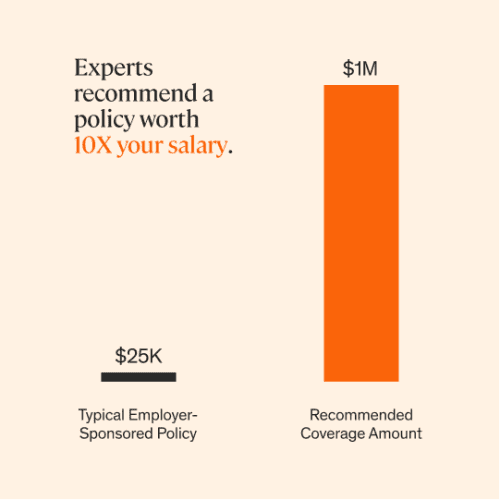According to the USDA, it costs about $234K to raise a child, without even considering college tuition. If you own life insurance at the time you pass, it can help ensure your children will have financial support to grow and live the life you want for them. Learn more about life insurance for parents.
If you’re the primary earner for your family, a life insurance policy can provide income replacement should something happen to you. A term policy can be customized to give you coverage through your peak earning years.
Even if you don’t provide an income, you likely provide a measurable value to your family that they would have to replace if you passed away. Salary.com found that stay-at-home parents contribute the equivalent of a $162,000 annual salary to their families. A life insurance policy for you eases the financial burden for your partner.
Life insurance can cover the support payments owed by a divorced parent. A term policy—which can be tailored to cover the years of owed child support—is a good option here.
Make sure the person you share your life with would be taken care of if you passed unexpectedly. It’s recommended that both partners in a marriage should have a life insurance policy that factors in things like debt, expenses, or future financial plans. Find out what you need to know about life insurance when you’re getting married.
A mortgage will probably be the largest debt you ever take on, and you wouldn’t want to leave your cosigner or family members stuck with it. If you own a home, consider life insurance coverage that lasts at least as long as your mortgage. Here’s what else homeowners should know about life insurance.
It’s natural to have concerns with covering your final expenses if you’re at or approaching retirement age. A whole life insurance policy can help cover these expenses, giving you and your loved ones valuable peace of mind.
If someone depends on you, like an elderly parent or family member with a disability, what would happen to them if you weren’t around? You may want to consider coverage to make sure they’d be taken care of.
Unfortunately, your student debt might not disappear if you pass away. If you have a private student loan, your parents, cosigners, or other family members could be on the hook for your debt.
You’ve put a lot of work into building your business. Life insurance coverage can help ensure that your business could continue operating if something happened to you.
Because life insurance rates increase as you get older, applying sooner means you can lock in your lowest possible rate. With that said, there are several milestones in life when you should reevaluate the coverage you have—or get some for the first time—to make sure you’ve got everything covered. These milestones include:
- Getting married
- Having a child
- Buying a home
- Taking on debt, like student loans
- Starting a business
- Planning for retirement
- End of life planning
/life-insurance-father-and-son-packing-boxes.jpg)
You may already have some life insurance coverage from your employer. However, that policy might only provide a fraction of the coverage you actually need. Employer-sponsored policies typically offer coverage that is about 1-2X your annual salary. Financial experts recommend having coverage that is about 10X your salary. This disparity can result in a large gap in protection if you’re solely relying on your policy through work—which is why many people buy individual term policies to supplement the coverage they receive through work.

/Stocksy_txpd617015cclW200_Medium_2772165_fq8edr.jpg)